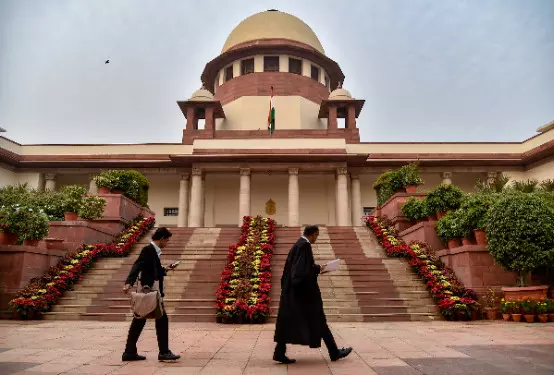Prez reference: SC says not fair after Centre claims 90% bills cleared in a month since 1970

New Delhi: The Centre on Wednesday told the Supreme Court that 90 per cent of the bills passed by state assemblies since 1970 have received gubernatorial assent within a month whereas assents were withheld by governors only in 20 instances of the total 17,150 bills.
A five-judge Constitution bench headed by Chief Justice B R Gavai, hearing the presidential reference on whether the court could impose timelines for governors and President to deal with bills passed by assemblies, objected to the Centre's move, saying “it will not be fair to other side as they were not allowed to refer to any such data".
The reference of empirical data on functioning of the Constitution by Solicitor General Tushar Mehta on behalf of the Centre also faced stiff opposition from senior advocates Kapil Sibal and Abhishek Singhvi saying they were previously barred from producing similar data.
The senior lawyers are representing those against the reference.
Of the 20 instances where assent was withheld, seven bills related to the recent row in Tamil Nadu, Mehta said.
“We did not permit them to show any data. This is not fair to them (those opposing the presidential reference). You had objected when they wanted to refer to their data,” the bench, also comprising Justices Surya Kant, Vikram Nath, P S Narasimha and A S Chandurkar, said stressing it would only focus on constitutional issues.
“In the last 55 years, 90 per cent bills were assented to (by the governors) within one month… and assent has been withheld in only 20 cases,” the law officer said.
Sibal interjected to suggest such disputes largely arose only post 2014 and said he was not allowed to refer to any such data.
“I have given empirical data on how the Constitution worked,” the law officer said.
Continuing the hearing on the ninth day, the bench observed the court faces an “enormous task” of balancing two extreme positions, one viewing Governor as entirely bound, and the other allowing wide discretion.
Mehta contested the arguments of the opposition-ruled states on governors being bound to act as mere transmitters of the will of elected legislatures.
He said governors were not postmen and such a “postman analogy” reduces the constitutional role of governors to an “ornamental” position.
“They argued he is only a postman with only two differences, a beacon on his car and a bigger house. That is a flawed constitutional argument,” he said.
Mehta added, “The role of the Governor as a mute spectator and merely acting as a rubber stamp would defy not only the very foundational position of the Governor, but would also be in defiance of the oath."
Article 200 states when a bill is presented, Governor should declare either he assenting to it or withholding assent or reserving it for President or returning it with a message to the assembly, Mehta added.
“The parties opposing the reference state that the option of withholding is a temporary option and must necessarily be followed by the option of returning the bill to the assembly. The said construction is antithetical to any elementary principle of interpretation as it effectively renders the usage of the term ‘withhold’ wholly illusory,” he said.
Governor is constitutionally a part of the legislature, Mehta said, even if without voting rights, and the legislative process itself culminates only when assent is granted under Article 200.
“The Governor is not an employee of the Government, nor an agent of the ruling party, nor required to act under diktats of political parties. There may be occasions where he has to be impartial, a neutral umpire when union and state interests are in conflict,” Mehta said, referring to a quasi-federal constitutional framework.
He said gubernatorial action on bills was “not amenable to judicial review, and even if it is, not justiciable to that extent.”
“There are situations where the Governor may legitimately require reconsideration or consultation, especially where apparent repugnancy with central law arises,” he said.
Referring to the volume of case records, CJI said, “It is the task of 16,000–17,000 pages… and unfortunately there is no vacation as well.”
Justice Nath specified the records were running into 25,000 pages.
Constitution must be read as a “living document", the bench said.
Justice Narasimha, on the other hand, asked whether it was acceptable to hold that Governor could withhold assent when the framework of federalism required dialogue.
“The assembly considers the Governor’s view, which may reflect the Centre’s perspective, but to say outright that assent can be withheld is a difficult proposition,” he said.
On the interpretation of the term “withhold” in Article 200, Mehta said it couldn't mean “temporary deferment".
“One word used in the same article cannot have two different meanings,” he added.
During the hearing, Congress-ruled Telangana government opposed the reference and said ordinarily Governor was bound by the aid and advice of the council of ministers even while dealing with the grant of prosecution sanction except for the instance where a minister or the chief minister was involved in a criminal case.
The court is examining 14 questions referred by President Droupadi Murmu, including whether constitutional authorities can indefinitely withhold assent to bills and whether courts can impose mandatory time frames.



